A new journey begins
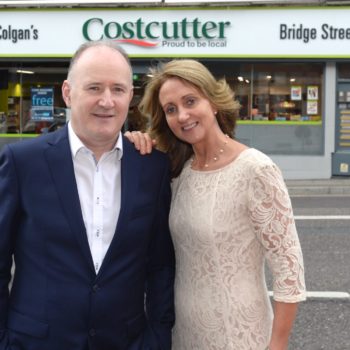
At an exciting time when the Barry Group is embarking on a three-year journey to become the number one convenience brand in Ireland, Gillian Hamill caught up with husband and wife duo, Jim and Niamh Barry, to learn how new additions such as the Urban Sips coffee concept, Market Street Deli and Go Burrito, will help accomplish this forward-thinking strategy
19 October 2017

Jim and Niamh Barry
I have to peel back the onion as much as possible.” So says Niamh Barry, describing her diligent approach towards research. And after just a few minutes talking to the qualified naturopathic nutritionist, ShelfLife quickly realises these are no empty words. In fact, Niamh has joined the Barry Group at a key time. As her husband, managing director Jim Barry explains, the family business is on a “three year journey” to make the Costcutter brand “the best option” in the convenience market.
She has been instrumental in creating a number of new concepts which Jim is confident will drive this “ambitious objective”. So what do these plans entail? Well, as you might imagine, the hero categories of coffee and deli will play a central role.
Hero categories
“Coffee and deli are the two most important categories so we’re putting a huge focus on them and we certainly wanted Niamh to get involved,” Jim says. “Niamh would be very strong from a food knowledge perspective due to her background. And within colour and image, she’s got an exceptional strength in those areas so we wanted to bring her strengths into the company to help crack our objective.” While the programme spans a three-year lifetime, in the more immediate term, Jim says the group “would be hoping to have some 50 units rolled out in under 12 months”.
The centrepiece concepts will be Barry’s Group’s impressive new ‘Urban Sips’ coffee offering and ‘Market Street Deli’ foodservice offering. Niamh’s fingerprints can quickly be gleaned on these vibrant new developments. In fact, she has masterminded a comprehensive plan to make these brands resonate with consumers (more on that later). But of course, even the best branding will fail if the product is not right to begin with. Perfecting the right coffee blend was subsequently Niamh’s first port of call.
Urban Sips
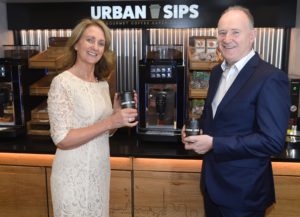
Jim and Niamh are confident that consumers will enjoy Urban Sips – a premium, barista coffee from a self-service machine
“The reason I wanted to get involved in Urban Sips was that I wanted everybody to experience a barista style coffee,” she tells ShelfLife. “I wanted to create that experience for them, where they can just go in, hit the button and enjoy a real treat. For the first time, I think we’ve created a barista style coffee that comes from a self-service machine.” Working with an experienced Irish brewer, she was determined to create a signature blend that would make Urban Sips stand out from the competition – a higher quality at the same price point of €2.50 – €2.80. “I was very conscious of what bean I was going to pick and what mix I was going to make,” she adds.
With a hearty laugh, Jim exclaims, “Niamh is the only person who knows the recipe!” Indeed, it’s clear that a huge amount of thought has gone into its creation and while the percentages of each bean used are kept strictly under wraps, Niamh is eager to explain the thought process behind their decision. Three different beans were used; from Nicaragua, Columbia and Ethiopia. And despite the increasing popularity of coffee in cities, Niamh had a mission in mind based on her research which showed Ireland is still predominantly a nation of tea drinkers, particularly within rural areas. “I think the predominant coffee taste [in cities] is more of a very dark roast and a very strong taste,” she says. “But when I looked at all the statistics, I could see that was only serving about 20% of the population, whereas there was about 60-70% of people whose preferences were not even being addressed.” For those who are used to drinking tea, it takes a little time to acclimatise their palate to the taste of coffee.
Whereas a strong roast is traditionally favoured by the French and the Italians, Niamh came to the conclusion that Ireland did not have a signature coffee in the same sense. Interestingly she says: “I found out that when you get more cultured into coffee, you actually evolve from being a fan of a dark roast into a medium roast, because you actually understand the flavours and aromas and can actually taste the full flavour, whereas with the dark roast, you just taste one big, strong cup of coffee.” Having decided on a medium roast as the best way to attract the 60% of consumers who are traditionally tea drinkers, Niamh’s next step was to ensure the “quality of the beans was top notch”.
Perfect blend
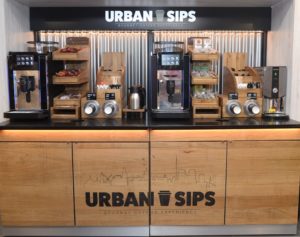
The Urban Sips unit uses “very organic materials like wood, corrugated iron, and the overhead lightbox” to draw consumers’ attention, says Niamh Barry
Coffee connoisseurs will undoubtedly appreciate her choice. The Nicaraguan bean is a high-graded Arabica bean, while the Ethiopian bean is a Yagur Chef bean, “one of the most high-rated, talked about beans out there”. Next up, the Columbian bean “brings a very smooth, rich taste,” Niamh says, “so I think the tea drinker is going to actually enjoy the experience, and that’s why I’ve called it a gourmet coffee experience because it has to be an experience all the way through, from the minute you walk into the shop from the minute you walk back out”. Importantly, the Nicaraguan bean also helps support a valuable CSR initiative, the Women’s Fund Project. Currently in Nicaragua, only men are allowed to own land titles which can only be passed down to a son or male relative. Subsequently, this leaves women in a precarious situation if their husband or father dies. “The Women’s Fund Project helps women get access to their land,” Niamh explains. “Once they can get a title to the land, they can get a loan and then they can actually work the land, helping them to support their families. That corporate social responsibility objective is really important to me; we must pay back hugely.”
At this point, ShelfLife is keen to hear Jim’s verdict on the final product. “Beautiful,” he beams. “We tasted a number of blends, but this one just stood out. I wouldn’t be the biggest coffee drinker but it was just the taste that remained on my tongue afterwards, it was really pleasant.” Although he drinks coffee socially, Jim concedes he is more of a tea drinker himself, although that’s changing now after such an extensive tasting process. “In the last six to nine months, I’ve drunk as much coffee as I did in the last ten years so I’m becoming a coffee drinker! The result is a very pleasant tasting drink” he says. “We had a very clear brief from day one of the challenge. We wanted a coffee shop experience and that challenge has been answered.”
Mental stimulation
With the product nailed, the next priority for Niamh and the team was to get the branding right. In keeping with her conscientious character, an in-depth approach was a must, with the psychology behind consumer decisions driving Urban Sips’ brand messaging. In fact, it has been specifically designed to appeal to the two different systems within our brains. With system one (the limbic system), brand perception is “make or break” instantly, according to Niamh. “Everything that’s fast, quick, bright and colourful, all goes to the limbic system in the back of our brain and we love that system because with it, we believe what we see straightaway. A lot of brands are built on that system where [perception is] spontaneous, but we also have a second system which is towards the front of our brains and that’s where we actually learn and rationalise.” And this is where the CSR message around the Women’s Fund Project plays a key role after the brand succeeds in getting “the taste and sensory perception right”. It provides a logical reason to support the brand, and the combination of both is what Niamh believes “will draw a customer back”.
In fact, she used six “side passes into the brain” to make the brand resonate with customers. These include the fact “that we learn by association”. Hence the phrase “gourmet coffee experience” is prominently written on the Urban Sips’ coffee cups to create an instant association with a premium barista experience. Secondly, Niamh emphasises “signal salience”, whereby human beings are naturally drawn to novelty. This is a prime focus of the cosmopolitan design which focuses on a unique Irish skyline; created by combining key focal points of Irish cities in one striking graphic. “We love novelty, so I’ve designed the entire aspect of the unit around that,” says Niamh. “We put corrugated iron on the back, with an urban font on the doors. We’ve used very organic materials like wood, corrugated iron, and the overhead lightbox, to draw your eye in and yet it’s at eye level, so psychologically you can read it. With metal around the doors, good quality materials have been used throughout.” Indeed, everything has been designed to grab the shopper’s attention.
Of course, retailers will also be keen to hear how the numbers stack up. According to Jim, the new Urban Sips model will result in more cash profit for Costcutter retailers because they will sell more cups. “You are talking about of a minimum usage of 200 cups a week, in order to make sense,” he says, in a typical straightforward fashion. At around 30 cups a day, this is an easily-achievable minimum and the MD says he’s expecting much more; this is only a starting point figure. In fact, in the first store trialling Urban Sips, coffee sales are already up by 30% so he is confident retailers will be pleased with the results. Different sized-units, ranging from 4 ft to 12 ft long, will also be available to allow every store to obtain the option that suits their needs best. The team has also chosen a sophisticated machine from Rex Royale, which they tell ShelfLife, when calibrated correctly, can create barista quality from a self-service machine.
Market Street Deli
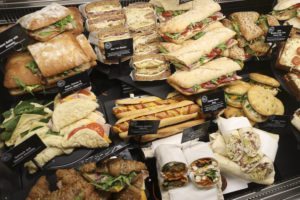
The Market Street Deli concept offers a variety of enticing, nourishing options
As well as this quality coffee offering, the new deli concept, Market Street Deli will be rolled out in certain stores, alongside the group’s existing non-branded deli offering. Nourishing, appealing food will be at the heart of the Market Street offering but before outlining this in further detail, it is useful to outline Niamh’s philosophy around food and balance. Indeed, it has a rich backstory going back to the influence of three key mentors during her childhood; three brothers from the Alexian Brothers religious order near her home, who she says, “compounded mind, body and spirit into me before I actually even knew what the whole thing was about!” The consequence of this is that while health and wellness is a fashionable topic today, particularly within the convenience sector, this is no mere ‘trend’ for Niamh – it has always been a central part of her life and has exerted a huge influence in her career. One which saw her become a third level lecturer in both biomedicine and nutrition at the college of Naturopathic nutrition.
The time is now
Throughout the years, Jim and Niamh have continually had conversations about how they could potentially bring Niamh’s expertise into the business, but agreed that the timing needed to be right. That time, they believe, is now. “Anytime we would have had a conversation on food, I would have always discussed the importance of real food,” says Niamh, “but even though Costcutter was ready for it, I don’t think the general public were ready. I think there has to be the right timing and synergy, but I really think that’s here now. People now ask me for information, even down to suppliers who are asking me about their own personal health problems, ‘what would you do here?’ I’ve never seen that before. It’s normally the students that have paid big, big money to study naturopathic nutrition who want that information. Now the general public are asking about it, so I think it’s the right time.”
With that in mind, “nourishment” is what Market Street Deli is aiming to achieve. “Within the deli, 46% of choices are made through our eyes,” says Niamh. “The importance of colour is vital. Every colour actually has a relation with how the body functions, for example, orange [boosts] the immune system. I think it’s time for people to know that in a very simple way and that is my mission, to actually try and get people to make wise choices, and Costcutter will become the leader in that area.” A grab-and-go fridge comprised of options such as sandwiches and wraps made freshly within Market Street Deli will also provide an instant option for consumers on-the-go. Staff training will likewise play an important part is helping shoppers to choose nourishing options, through workshop and education programmes. As Jim puts it: “The more they understand about it, the better.”
Focus on the future
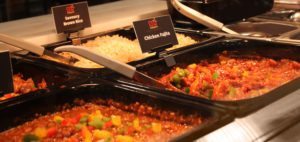
The Go Burrito concept is proving a hit with millennials
This focus on foodservice will safeguard the future of the convenience sector, according to Jim. “Ultimately, what’s happening is that convenience stores are having to look at where their future is and they have to venture more into food and coffee,” he says. “You’re seeing a reduction in space for ambient, with more space being allocated to coffee and impulse lines. To that end, we’re going to create a lot of impulse areas within the store by installing queuing systems and identifying more and more impulse hotspots within the shop.”
Barry Group will also be developing a number of sub-brand concepts which retailers can add to their offering as suits the needs of their store. The first of these concepts to be revealed is the Mexican ‘Go Burrito’ offering. Targeted at the millennial market aged 18-34, who are often keen gym-goers, this was trialled in the Rathfarnham Costcutter in June. Plenty of time to maximise sales from the local schools, by having all aspects of it tweaked by September.
Again, Jim emphasises that “the stable of eight or nine sub-brands,” Barry Group will be building on in the coming months, will not necessarily be right for each store but the group’s account managers will work with retailers to choose the best options for them. “Every store is different,” he says. “If you’re near a school and there are lots of kids around, Go Burrito is a good possibility but if you have an older population in the area, then Go Burrito is probably not what you want.” The group’s plan is that its different sub-brands will be able to accommodate what the latest, hottest pop-up trend of the day is, and Jim says that by January or February, another three or four sub-brand options will have come on stream.
Upping the bar
With all these new additions coming on board to re-energise the brand, we were keen to hear the impact Barry Group projects they will have on the business. “We are looking at our turnover number as opposed to the number of new stores added,” Jim tells ShelfLife, “but we’re hoping to add on approximately 50% to Costcutter in three years, in terms of turnover. We are looking at maybe 15, 20 new stores per year for three years, and we are now targeting a higher turnover level store than we would have in the past.”
Ambitious plans of this nature naturally require a strong team, and fortunately Barry Group has a motivated workforce. Working together closely as a husband and wife team doesn’t seem to pose any problems for our cover interviewee duo either! “I actually have no problem at working together at all,” Niamh declares. “Jim is more of a logical thinker and I’m more creative – but one enlightens the other. I think it’s not too often you get to work opposite your soulmate; it’s a positive thing.” Jim adds: “We’ve got very different strengths and I think we’re honest enough to realise what we’re good and bad at. Niamh has done something that would not be my greatest strength,” he continues. “It’s also great for the team because we put ourselves forward as a family business. We are truly a family business and that makes us even more authentic. You have other companies out there who aim to be a family business but it’s a big stretch; for us it’s real.”



 Print
Print

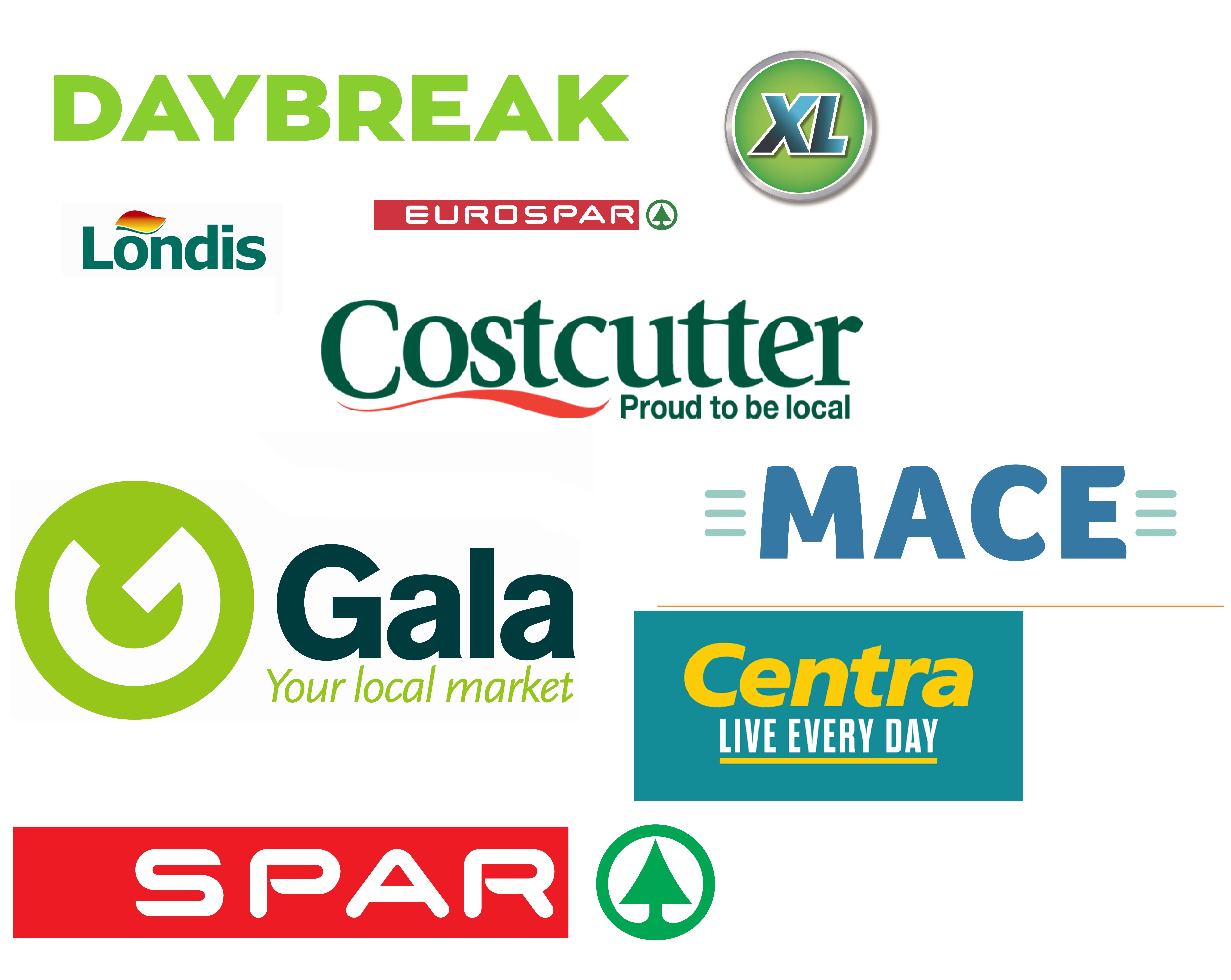


Fans 0
Followers